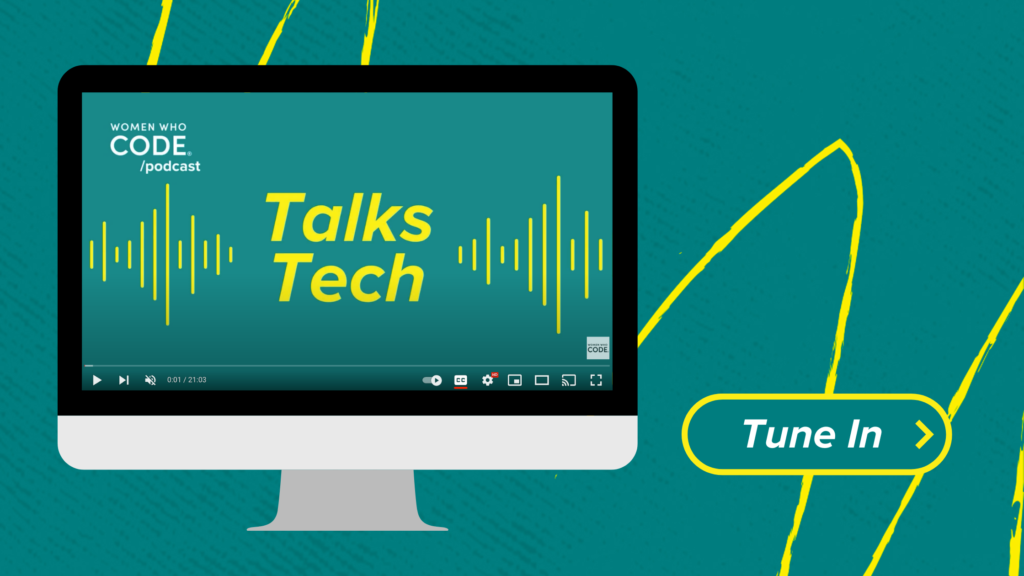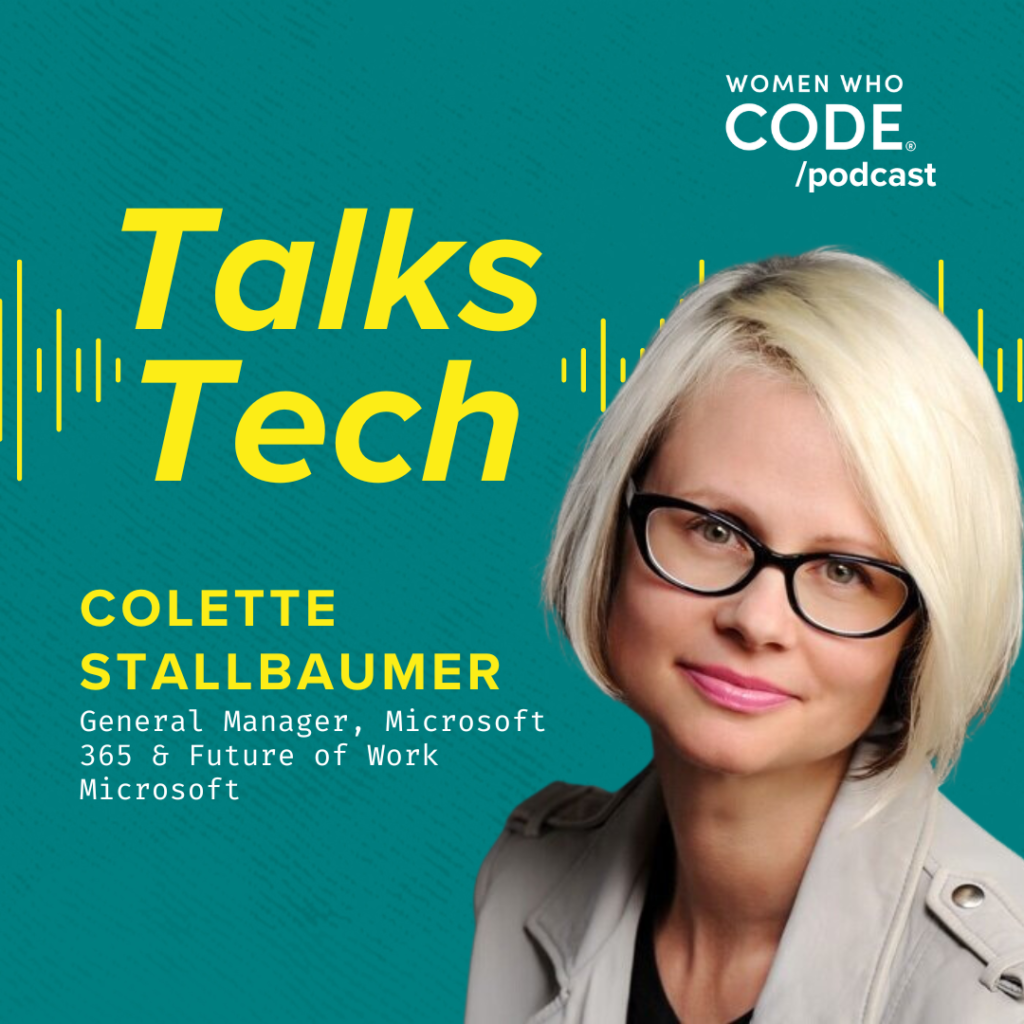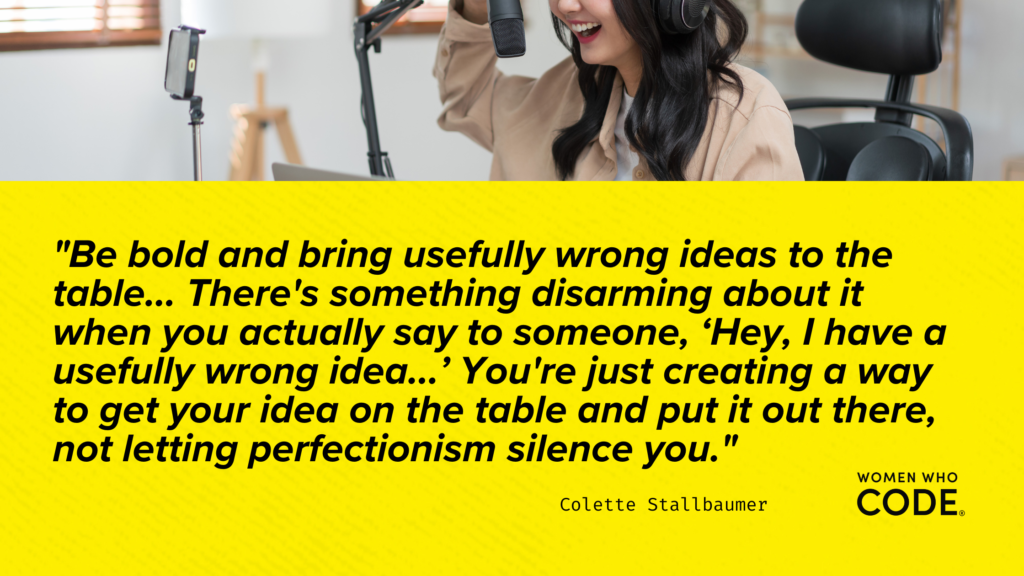Talks Tech #60: The Most Talked-About Tech Disruptor of 2024: Artificial Intelligence
Written by Colette Stallbaumer
This article has been adapted from the audio recording of Talks Tech #60.

Naomi Freeman, Advisor to the Board and Chair of the Strategy and Technology Committee to the Board at Women Who Code, sits down with Colette Stallbaumer, General Manager of Microsoft 365 and Future of Work Market at Microsoft, for their discussion, “The Most Talked-About Tech Disruptor of 2024: Artificial Intelligence.” They talk about Colette’s childhood on the farm, her career journey at Microsoft and as a business owner, and AI.
Tell us about how you first got interested in tech.
Growing up on a farm in Nebraska, I’ve always been a tinkerer. I was the oldest of six kids. It was a small town, four hours from the nearest airport. I also had a lot of freedom for my imagination to run wild. I was a total geek. I loved Star Trek and Star Wars. Ironically, there’s a lot of machinery and equipment on a farm. I had an understanding from a young age that technology exists to help you do things in the world. I am also a very curious, creative person.
I read that you secured the title of Nebraska’s State Speech Champion. Is that true?
Yes. Communication and a love of words came really early on. I think being from a small town, books were a window into the world. I spent much of my childhood reading and got into speech and debate fairly young. I was fairly good at it. Finding this talent for public speaking was one of the earlier things that I discovered, and it looked like it was a path for me to go from a very small town to a bigger city where there would be more opportunities.
Was one of your first trips with the speech and debate team outside of your hometown?
It was. It exposed me to going places beyond my front door.
Can you walk me through the timeline from speech champion to marketing and tech professional?
I have a journalism degree and an Advertising major in Marketing, English, and Sociology minors. After college, I had the desire to move from Nebraska to a larger city. I made my way to Chicago, where I worked for advertising agencies. That gave me such a good grounding and appreciation for the craft and what it means to understand market research and understand how to build brands. Then, I made my way to the Pacific Northwest, where I also did some things in startups. In the Pacific Northwest, technology was happening at that time. I started to make my way from an advertising agency career into technology. I did a number of different things but landed at Microsoft.
You also owned your own business, which is really interesting to think about. Have you been at Microsoft steadily since you arrived at Microsoft, or did you come in and out?
I’ve been at Microsoft steadily now for more than 20 years. I had this small side hustle as a boutique owner before, and that was a popular thing to do. I was doing it on the nights and weekends. I was presented with an opportunity to explore that, and I had a partner who was more the person on the floor all day. It was called Sway and Cake and is still around in Seattle as a boutique. What’s so amazing today for young people is that there needs to be a linear career path. You can have all these different experiences. Maybe I was a pioneer there before I knew it. While at Microsoft, I started in advertising. From there, I moved into marketing. I worked on our first interoperability or openness campaign. Then, I worked on the first-ever cloud campaign. I would say that brings me to what I would call one of my biggest career departures or left turns. I became a speech writer in the CEO’s office.
What does your work mean in practical terms, and at this point, what are we at with AI?
We’re so excited about Microsoft Copilot and, in particular, Copilot for Microsoft 365 and what it can do for people at work. This amazing tech inflection point that we all find ourselves at is where using natural language with these large language models can help you do amazing things. I can turn to Copilot and say, “Tell my team how we updated the product strategy in such and such a meeting this morning.” Or I can start my day by saying, “Tell me what’s hot in my inbox today or what emails my boss sent me in the last 24 hours?” It’s just this whole new way of thinking about how we work and how we interact with technology.
You’re leading the Future of Work team at Microsoft. What is that?
I’m privileged to lead our work on the Future of Work, and it’s a big responsibility and opportunity to work on that. That arose as my next role after the office of the CEO. We had all this rich research on how work was changing, but we needed to broaden it more so that people could understand those trends deeply. We birthed a deep partnership with my PR partners at Microsoft, the Work Trend Index, and Work Lab. We have helped customers navigate through the pandemic, which has changed work trends and patterns. Now, we’ve turned our research engine, focus, and all the brilliant scientists to studying how AI will change work. I am lucky and blessed to lead this really important work at Microsoft.

Can you share your perspective on AI’s development over the years, how it has already impacted businesses and jobs, and how the folks are working?
There’s so much potential. Take an industry like healthcare; some of the more interesting things that are emerging are, for example, if you are a doctor, you don’t have to write up patient notes anymore. You can use AI to capture those in an accurate way. Think about the time that frees doctor to focus more on their patients and patient care. Taking another step further, what if AI can help when that doctor follows up with that patient?
For yourself moving forward, what do you think the role of the communications professionals in tech will look like?
With Copilot, it’s sort of like everyone gets a new assistant or a direct report. It’s a highly capable assistant. That requires these new skills around delegation, exercising good judgment, and the ability to apply subject matter expertise. Those are some essential skills for the machine age or the age of AI. You’re going to get more content. Getting that good first draft is going to be really easy. Getting from good to great is where people come in, being able to evaluate and use judgment to decide what to do with the content that you get.
Regarding tech and innovations for other things that are coming in the future, what else do you think people should be paying attention to on the horizon?
There’s so much. AI is going to be the next big thing for a while. We’re in the early innings or just at the start of this transformation. I’m seeing so many glimmers and glimpses of interesting things about where this could go.
What was the most fun or surprising thing that Copilot did when you showed up one morning, and you were like, “Oh, good morning, how are you?”
When we were using it really early on, before we’d even announced and released the product, seeing what it could do in meetings was exciting. It could capture an entire meeting discussion and provide a summary and really get right who said what, what the key points of agreement and dissension were, and the tone and sentiment of the meeting. Those kinds of things were real surprise and delight moments early on.
In your previous role, you worked side by side with Microsoft CEO Satya Nadella to completely change the culture of the company during a pivotal time. Please tell us a little bit about that.
I joined Satya’s office and team in 2014 when he became CEO. It was a real left turn in my career. I was asked if I would consider doing this, and I needed to learn about being a speech writer. It was the role before I joined his office that I took a scary left turn, and that prepared me to do the role in his office. Do the things that scare you. Take those big gambles. Those are the opportunities that can be really career-defining. I was really fortunate to have the opportunity to work in the office of the CEO when we were going through this massive culture transformation at Microsoft. It aligned with my values and what I’m passionate about in terms of this intersection of technology and culture. Embracing ambiguity and saying yes to opportunities that scare you are definitely things to use as guiding light posts in your career.

What’s your pro-tip for women looking to follow in your footsteps and become leaders in tech?
Be bold and bring usefully wrong ideas to the table. That’s a phrase I use a lot at Microsoft and with my team. There’s something disarming about it when you actually say to someone, Hey, I have a usefully wrong idea. You’re already right out of the gate, telling them. It gives them the signal; it puts them on notice that what I’m about to say might not be entirely right, but listen carefully because there might be some real gems in here. You’re not downplaying or deprecating yourself or your contributions. You’re just creating a way to get your idea on the table and put it out there, not letting perfectionism silence you. Be brave and be willing to put your ideas out there. Also, show up for each other with empathy and kindness.